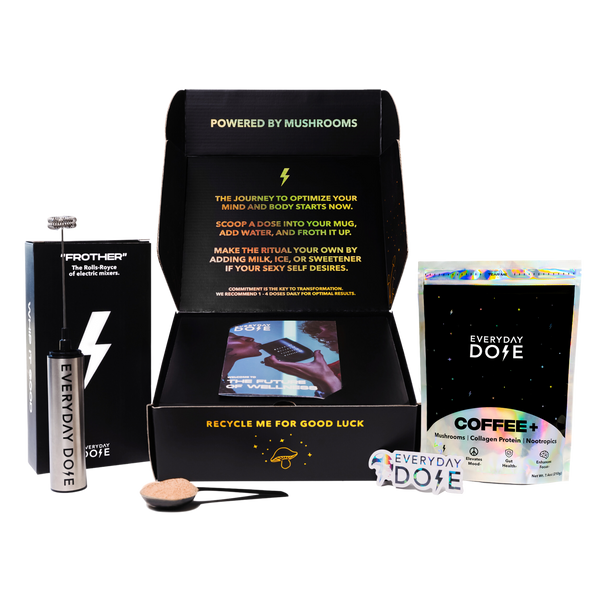Gut Health and Acne: What Does the Science Say?

Is there really anything worse than waking up with an unexpected pimple? It’s like our skin saves these acne breakouts specifically for important occasions like a big presentation or a fancy date.
Many of us may chalk our breakouts up to ill-fitting skincare products, changes in weather, or even unwashed pillows — and these things can definitely contribute to acne. But what if there’s another, deeper cause for those breakouts that just keep coming back? Here’s everything you need to know about the link between gut health and acne.
What Is Acne?
First, let’s make sure we’re on the same page about what acne is to begin with. While a stray pimple or two on otherwise clear skin can definitely be frustrating at times, acne is usually much more severe.
Acne occurs when hair follicles become clogged with sebum, dead skin cells, and specific types of bacteria. These bacteria (such as P. acnes) feed off of the sebum, reproducing rapidly and causing irritation.
While it’s true that acne can show up in the form of regular whiteheads, blackheads, and pimples, it can also cause deep cysts and nodules. These are quite painful and difficult to address without dermatologic care.
Are Gut Health and Acne Related?
Since acne is a skin condition, it’s easy to think that we need to focus on our skin health in order to address or avoid it. However, our bodies are much more interconnected than you might think.
Our skin is home to thousands of species of bacteria, all of which coexist in a delicate balance. When they’re balanced well, these bacteria do a great job of fighting off bad bacteria (such as the kind that can cause acne).
However, if our skin microbiome is imbalanced, the bad bacteria can overtake the good bacteria. This can potentially cause issues like acne (as well as some others).
Our skin microbiome is heavily connected to our gut microbiome via what’s called the gut-skin axis. Our gut microbiome is like the master microbiome, and it influences pretty much every other area of health.
If our gut microbiome is imbalanced, it can cause widespread irritation throughout the body. It can also cause the skin microbiome to become unbalanced. Furthermore, it can affect our body’s ability to absorb nutrients and lower our immune function, which can make our skin less able to fight off infections from acne-causing bacteria.
6 Ways To Support Clear Skin
It’s clear that gut health and skin health go hand-in-hand. In fact, gut health is also connected to all kinds of other skincare concerns, such as eczema, rosacea, and more.
If you want to use a multi-pronged approach to address breakouts, it can help to make some changes to support your gut health. Here are a few ways you can get started.
1. Eat Plenty of Probiotics
Probiotics are good bacteria that you can eat to restore balance to your gut microbiome. Some people choose to take probiotic capsules because they’re easy and convenient. However, you can also get plenty of probiotics in your diet if you enjoy eating fermented foods.
Probiotic-rich foods include the following:
- Kefir
- Kombucha
- Kimchi
- Sauerkraut
- Miso
- Tempeh
- Yogurt
- Cottage cheese
- Vinegar
- Traditionally-made pickles
2. Prioritize Prebiotic Fiber
If you’re going to ingest some extra probiotics, it’s also important to make sure you eat some food that will help them stay alive once they reach your gut. This is where prebiotic fiber comes in.
Prebiotic fiber is a type of soluble fiber that is resistant to digestion. This fiber makes it to our colon largely undigested, where it is fermented by good gut bacteria. These bacteria reproduce rapidly, colonizing the gut and restoring balance.
Good examples of prebiotic fiber include the following:
- Artichokes
- Onions
- Garlic
- Leeks
- Whole grains
- Legumes
- Lentils
- Bananas
- Asparagus
You can also find prebiotic fiber in some mushrooms, such as lion’s mane mushroom. That’s just one reason why we included this mushroom in our Mushroom Coffee+. When getting prebiotic fiber is as simple as simply drinking a cup of coffee, taking care of your gut can be easier than ever.
3. Manage Stress
Stress can have a huge impact on both your gut microbiome and your skin. Have you ever noticed pimples pop up during seasons of high stress? What about bouts of indigestion surrounding moments of anxiety? In these cases, your woes can likely be traced back to stress.
Try incorporating some stress-relieving supplements and relaxing activities like meditation, yoga, or journaling into your daily routine. You could also try walking or jogging in nature — it’s a great way to get some fresh air and reset your mental health.
4. Update Your Skincare Routine
Up until now, we’ve talked about supporting gut health — however, there’s nothing wrong with taking a multi-pronged approach to your acne. While you make changes for your gut health, you might also want to consider updating your skincare routine.
Some skincare products contain probiotics designed to improve your skin microbiome. Others contain ingredients like salicylic acid that can reduce sebum production and deep clean your pores, which helps clear out some stubborn pimples.
5. Work With a Dermatologist
Ultimately, acne is a dermatologic condition, so it’s important to work with a qualified healthcare provider or dermatologist. Some cases of acne may not respond to any of these changes — in these cases, you and your doctor can work together to find a prescription medication that may help clear up your skin.
Wrapping Things Up
Acne breakouts can often show up at the worst times, but there are some ways you can address them. Surprisingly, one way you can support your skin is by supporting your gut. Your skin and gut microbiomes communicate via the gut-skin axis, which means what affects one can affect the other.
At Everyday Dose, we know that gut health is the holy grail of wellness. That’s why our mushroom blends are designed to support the gut with lion’s mane mushroom and collagen protein, as well as encourage mental health and clarity with L-theanine. To learn more about our blends and their benefits, visit our blog
today.
Sources:
Acne: Who gets and causes | AAD
The Gut Microbiome as a Major Regulator of the Gut-Skin Axis | Frontiers
Compound produced by bacteria protects the skin | National Institutes of Health (NIH)
Probiotics and prebiotics: What you should know | Mayo Clinic








